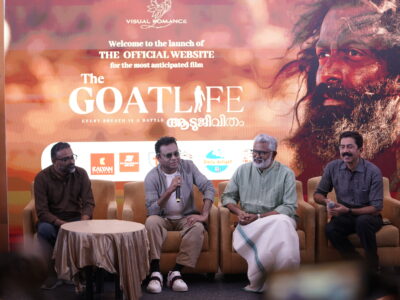Prithviraj Sukumaran’s fabulous performance drives director Blessy’s heart-wrenching survival drama, writes Srivathsan Nadadhur
Story:
Najeeb Mohammed, married to his lady love Sainu, leaves behind a quaint small town in Kerala in search of greener pastures to the Gulf, accompanied by a friend Hakeem. Losing themselves in an alien land, knowing little of its exploitative ways, they’re left stranded in the middle of a remote desert and sold as shepherds to landlords. Is there any light at the end of the tunnel?
Review:
One of the biggest gifts bestowed to mankind is the survival instinct. Regardless of all odds, man finds a way to live, adapt, stay hopeful and dream of a better tomorrow. But, what if that tomorrow seems a distant reality? What if survival seems a dream altogether? Aadujeevitham a.k.a The Goat Life is a triumph of human spirit, centred on a protagonist with little or no identity beyond a goat.
Najeeb is a voiceless, helpless slave/shepherd in the Gulf with nowhere to go to – merely breathing with no sense of time or hope, left to decay in a desert land. His only treasure is his past with the beloved. He hasn’t bathed or looked at the mirror for ages and drinking water is itself a luxury. Najeeb resists oppression initially though he is left with no option but to succumb to his master over time.
Aadujeevitham, like what you’d expect out of a survival drama, revolves more around a protagonist’s inward battle. Najeeb is surrounded by monsters in the guise of humans and is also fighting within himself to stay alive, to find a ray of hope before it’s too late. Director Blessy is committed in showcasing the minutiae of Najeeb’s dire reality, almost risking stagnancy in the storytelling.
At times, the film intentionally seems like watching paint dry. Blessy wants the viewer to be a fly on the wall and experience the painful mundanity in Najeeb’s life. Pushing Najeeb to take charge of his destiny is a fellow slave’s plight, who has also forgotten his name, giving up any hope of a rescue act and eventually breathing his last in a no man’s land, left to birds.
The drama naturally comes alive when Najeeb finds light at the end of the tunnel. The situation is so testing that he has to choose between water, food at the hands of an oppressor and fleeing through an escape route fraught with risks. He fondly bids goodbye to the camels and the goats, his only companions in the desert and says ‘I don’t think I can ever see you again.’
The element of adventure in Najeeb’s return along with pals brings urgency and tension to the film – they’re more vulnerable than ever before, perhaps more than they were under their inhuman bosses, battling desert snakes, sand dunes, hunger and thirst. Blessy’s asset as a director lies in his portrayal of vulnerability – physically and emotionally.
Najeeb wasn’t a survivor just because he’s the protagonist of the film. Beyond courage and spirit, he was luckier than Hakim to have lasted all the way. The physical transformation of Prithviraj notwithstanding, his excellence as a performer comes to the fore in the brutally honest portrayal of Najeeb, sans any needless exaggeration or desperation to win over a viewer’s empathy.
Aadujeevitham, as an adaptation, does a masterful job of translating the philosophies of the written material visually, even without saying much. The visualisation and the seamless editing replete with metaphors, alternating from the desert lands in the Gulf to the beautiful backwaters in Kerala, is nothing less than stellar, showcasing human resilience and nature in all its contours.
AR Rahman’s brooding, tense music score reflects the grim mood of the film, while Periyone Rahmane and Omane are the pick of the lot in the album. Jimmy Jean Louis has a stately presence that helps you buy his saviour act, with KR Gokul doing complete justice as Najeeb’s only familiar companion in the desert land. Amala Paul shines in her brief appearance too.
Verdict:
Aadujeevitham, with its grim backdrop and intentionally sedentary treatment, isn’t an easy watch, but it gradually draws you into its ambience with its emotional transparency. Go for it for Blessy’s heartfelt attempt to capture a survivor’s trauma and his unlikely escape from oppression, brought alive masterfully through Prithviraj Sukumaran’s tour de force act.
Rating: 7.5/10














